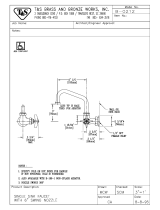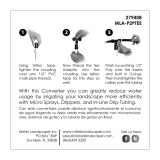Page is loading ...

TROUBLE SHOOTING
MAINTENANCE
1. Shut off hot and cold water supplies under sink. Plug sink drain with cloth to avoid losing small
parts. Remove old faucet. If faucet has no spray attachment, proceed to STEP 4.
2. Attach sprayer nozzle to spray hose.
3. Align decorative collar over right hole in sink and
place sprayer hose support through collar and right
sink hole. Thread wing nut onto threaded shaft from
below sink.
4. FIT GASKET TO BOTTOM OF FAUCET BODY BEFORE
INSTALLING FAUCET ON SINK.
Install faucet on sink with the C (cold) on the right and
the H (hot) to the left. From under sink, thread wing nut
to threaded shafts. Hand tighten.
Thread sprayer hose to central threaded shaft.
5. ALWAYS WRAP THREADED ENDS WITH TEFLON
TAPE BEFORE CONNECTING WATER LINES.
Insert hose up into faucet line and carefully tighten nut.
Use care to not bend hose. Bent hoses void the
warranty.
IF YOU NOTICE ANY MINOR LEAKS, TIGHTEN
NUTS SLIGHTLY. IF LEAKS PERSIST, REFER TO
TROUBLE SHOOTING.
6. Remove aerator and
turn on water. Allow
both hot and cold water
to run for at least one
minute to flush system
of any loose debris.
Replace aerator.
INSTALLATION PROCEDURE
2
4
5
6
3
Design House is a registered
brand of DHI Corp.
Mequon, WI 53092
1-800-558-8700
TWO HANDLE
KITCHEN FAUCET
Your new Design House faucet will give you years of trouble free performance. Thank you for
choosing our product for your home. Please read all of these instructions carefully before
installing your new faucet.
Helpful tools to install this faucet:
IMPORTANT POINTS
When installing your new faucet, hand tighten the connector nuts, then use one wrench to
anchor the fitting and a second wrench to tighten the nut one additional turn. Connections that are
too tight will reduce the integrity of the system.
Wrap all threaded connections (except aerator thread in spout) with Teflon tape available from
your local hardware or plumbing supply store. Always wrap in a counter-clockwise direction.
If replacing an old faucet: Prior to installation, turn off the cold and hot water lines and open the
old faucet to release built up pressure. Then cut both water supply pipes approximately 15" below
the bottom of the old faucet taking care that pipes remain circular. Remove burrs or rough edges
from cut ends with fine grit sandpaper.
SAFETY TIPS
ALWAYS protect your eyes with safety glasses when cutting supply lines.
basin wrench
Teflon tape
(2) crescent wrenches
silicon sealer
flashlight
faucet supply tubes
TROUBLE SHOOTING
SPRING
FAUCET BODY
GASKET
SPRAYER
HOSE
WING NUT
COLLAR
FAUCET LINE
HOSE
SUPPORT
SPRAYER
HEAD
CONNECTOR
SPRAYER
HEAD
WING NUT
INDICATOR CAP
SPOUT CAP
SPOUT
HANDLE SCREW
HANDLE
AERATOR
RUBBER VALVE
SEAT
RETAINER NUT
CARTRIDGE
O-RING
O-RING
O-RING
Many of these
parts come
preassembled.
This exploded
diagram is to
assist in trouble
shooting.
Models 529065, 529107, 529511
529545, 527119, 527127, 527135
527366, 527796, 528257, 529032
529040, 527499, 528059, 528067
529131
H
C
HOT
COLD
SPOUT
C
H
Problem: Faucet leaks from under handle.
Cause: Retainer nut is loose or o-ring on
cartridge is dirty or twisted.
Action:
1. Move handle to OFF position. Remove the
handle by unscrewing handle screw.
2. Tighten the retainer nut by turning it
clockwise. Move the cartridge stem to the ON
position. The leak should stop around the
cartridge stem.
3. If the leak does not stop, shut off the water
supply. Remove the retainer nut by turning it
counter clockwise. Lift out the cartridge valve.
Inspect the o-rings. Clear debris, untwist, or
replace if necessary.
4. Replace the cartridge making sure the wings
fit well into the cuts in the faucet body. Tightly
screw the retainer nut onto the faucet body.
5. Reinstall the handle.
FOR FAUCETS WITH A SPOUT CAP:
Problem: Leaks from around top cap of spout.
Cause: O-ring is incorrectly fitted, damaged or broken.
Action:
1. Tighten cap.
2. If the leak persists, remove cap. Inspect the rubber packing inside of cap.
Smooth out with fingers and thread the cap.
3. If the leak persists, unscrew the cap of the spout.
4. Remove spout and smooth out the twisted o-ring, or replace it if it is
damaged.
5. Reinstall the spout and firmly screw the spout cap back on.
Problem: Faucet leaks around aerator or an
improper flow pattern.
Cause: Aerator incorrectly fitted or dirty.
Action:
1. Unscrew the aerator. Make sure all internal
parts are laying flat.
2. If there is debris, gently flush all parts inside.
3. Reinstall aerator.
Problem: Water does not completely shut off.
Cause: Rubber valve seat is dirty, stuck or broken.
Action:
1. Determine which side (hot, cold or both) is
leaking by shutting off the cold water supply first. If
leaking persists, the problem is on the hot side.
Shut off the hot water supply to determine if both
sides have a problem.
2. Remove the handle on the problem side.
Loosen the retainer nut and lift out the cartridge
assembly.
3. Inspect the rubber valve seat in the faucet body.
Remove any debris. If the rubber seat is stuck
tightly in the water hole, push it gently with
fingertip so that it moves up and down smoothly.
The spring (with smaller end up) must be replaced
underneath the valve seat. If the valve seat is
worn or broken, replace it.
4. Replace the cartridge making sure the wings fit
well into the cuts in the faucet body. Tightly screw
the retainer nut onto the faucet body.
5. Reinstall the handle.
Your new Design House faucet is designed to give you years of trouble free performance. Keep it
looking new by cleaning it periodically with a soft cloth. Avoid abrasive cleaners, steel wool and harsh
chemicals that will dull the finish and void your warranty.
Brass finishes are polished, then protected with a lacquer coating to help prevent tarnishing. Clean
these surfaces only with a damp, soft cloth.
CONSUMER PROTECTION WARNING
Under the Safe Drinking Water Act, the U.S. Environmental Protection Agency restricts the
amount of lead used in brass and solder. Your new faucet is made in strict compliance with all
government standards. The materials used in the manufacture of this faucet are of industry
standard quality and are similar to other plumbing products having brass fittings.
To reduce the amount of lead in your drinking water, allow the water to run for a moment before
filling your glass and remember to always use cold water for drinking purposes.
C
/





